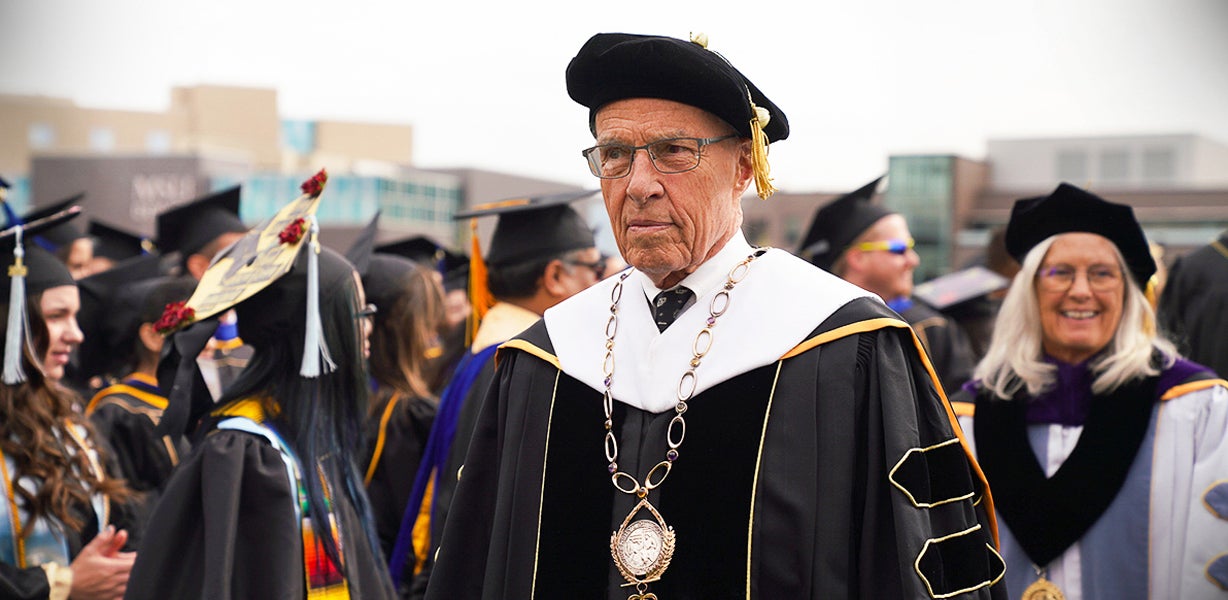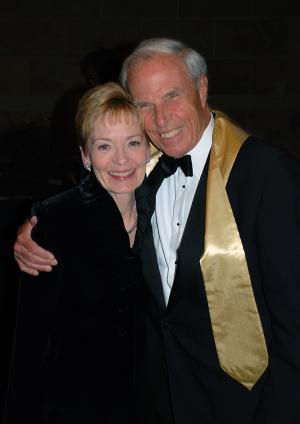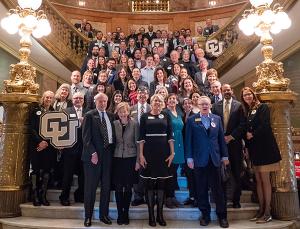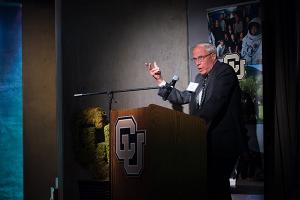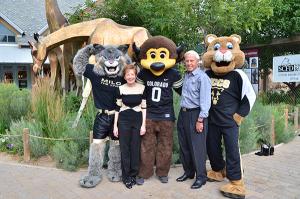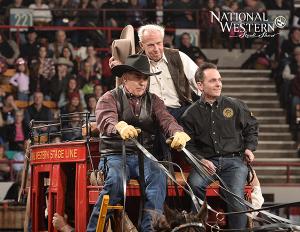Five questions for President Bruce Benson
Friday marks the end of Bruce Benson’s presidency of the University of Colorado. He presided over the four-campus system for more than 11 years, making him the longest-serving CU president in more than 65 years. Yet many thought he wouldn’t make it near that long. He went through a contentious selection process in which some questioned his lack of academic credentials (he earned a bachelor’s degree in geology from CU in 1964), his partisan political background (he was the 1994 Republican gubernatorial candidate in Colorado and four times led the state Republican party), and his career as an oil-and-gas man. Benson proved the doubters wrong during an 11-plus year run at the helm of the university.
Enrollment hit record levels on all four campuses. Some 160,000 women and men earned CU degrees. Internally generated financial aid increased from $88 million in 2008 to $202 million today. Research funding topped $1 billion. Fundraising set several annual records, increasing from $135 million to what is expected to be more than $500 million. Benson and his wife, Marcy, chaired the Creating Futures fundraising campaign, which exceeded its $1.5 billion goal in 2013. In January, he kicked off the public phase of Essential CU, a $4 billion campaign already more than halfway to its goal. CU’s budget went from $2.2 billion to $4.8 billion.
Benson focused on the promoting and protecting CU’s reputation, launching the All Four: One marketing campaign. He established the CU Advocates program, a 5,000-member grassroots group that helps advance the university around the state and beyond. CU for Colorado is an interactive map that shows all the sites where the university has outreach programs and health care locations. He continually preached the importance of CU’s campuses as forums for the free exchange of ideas. And he never missed an opportunity to talk about the importance of teaching students how to think, not what to think.
Benson, who turns 81 on the Fourth of July, said he’s retiring from CU but he’s not retiring. He intends to go back to Benson Mineral Group, the oil-and-gas company he founded 1965, and to look for opportunities where he can continue to contribute to his community, as he has done throughout his life. As the CU presidency transitions next week from Benson to Mark Kennedy, the incumbent talked with CU Connections about his 11-plus years on the job.
1. What surprised you most about CU?
I have told people this a lot, but I was pleasantly surprised by the quality of the people at CU. In my long association with the university, I have known and been impressed with many of its people. But after getting an up-close look at them and working with them, I was even more impressed. And it’s not just the leadership teams, it’s everyone from the custodians to the chancellors. Across the board, the people at CU are first-rate.
I also knew about the quality of the faculty before I came here, but serving as president has given me a particular insight that comes with meeting with, talking with and interacting with faculty and seeing them in action. My takeaway is that we have one of the best faculties anywhere, bar none. An amount of focus tends to be placed on Nobel laureates, MacArthur “Genius” Award winners and National Academy of Sciences Fellows, and rightfully so, but all our faculty members are dedicated, accomplished and committed to student success. I’ve always said to be a great university you need a great faculty, and I believe that’s true at CU on both counts.
I was also surprised a little by the breadth of our operation. When you have campuses in four cities, a system administration office, affiliate partners like the hospitals, it gets pretty complex pretty quickly. We’re a $4.8 billion annual operation. And while we are not a business in the traditional sense of making widgets, we are a business in terms of operating efficiently and effectively. The goal in running this business is creating an environment where the fundamental activities of teaching, learning, research and service can thrive, and I think we’ve done that. We’ve managed the growth of the university well over the past decade-plus. Our budget has more than doubled in that time – from $2.2 billion to $4.8 billion – but we have been able to accompany that growth with some effective management. We’ve had great success ensuring efficiencies and sound business practices. We also secured more than 100 pieces of legislation from the Colorado General Assembly to drive efficiencies and find new revenue streams. All that helps us foster effective teaching, learning, research and serving our state and beyond.
2. What is the most important thing the university does?
It’s pretty simple really. We educate students, preparing them for their future but also developing the highly skilled workforce Colorado and the nation needs. We conduct research that improves lives, helps us understand our world and addresses societal issues. And we contribute to our state with that education, research and service. One result is that CU has a $12 billion annual economic impact on Colorado. But more important, we are a key part of the fabric of our state. We’ve been here since 1876 and as Colorado has grown, so has CU. It’s been a great relationship that’s mutually beneficial. With all the change occurring in our state, CU is a constant. That doesn’t mean the university doesn’t change with the times. Quite the opposite – it means that in many ways we drive change or lead change. But at the end of the day, the mission of a public university such as ours is to serve the state.
I would also note that one of the most important things CU does is to provide students with a broad, liberal arts education in the traditional sense. While there is lots of justified demand for meeting needs in STEM fields, we should never lose sight of the value of a classical education. In fact, I think it’s more important than ever that we prepare people with a well-rounded education. The skills that emerge from that tradition – communication, problem solving, teamwork and a broad view of problems and solutions – are more essential than ever in our world.
3. What should people who work at CU know about the university that perhaps they don’t know?
How well regarded we are. When we work in a place, we don’t always see or understand or appreciate how we are viewed, particularly outside the organizations. One of the great things about being president is that I have been able to get a broad perspective inside and outside CU. I can’t tell you how many times over the past 11 years – at events, donor meetings or business and community activities – that people go out of their way to tell me how pleased they are with the direction of CU or things we are doing.
Coloradans are proud of their flagship university system. And it’s not just alumni, it’s people all over the state. A big part of that is that everyone in the organization plays a role in shaping our reputation, and they’ve done a great job with it. We all know we had some rough times a dozen or more years ago and that our reputation took a hit. Polling at that time showed an “approval rating” hovering around 25 percent. Polling we did just over a year ago shows it’s now at 75 percent. Our most recent alumni satisfaction survey shows 97 percent of graduates of all four campuses report that they are either “satisfied” or “very satisfied” with their CU education. And I think a lot of that has to do with the efforts of the people in the organization to pay attention to our reputation. People who work at CU should be proud of how we are viewed.
4. What were some of the personal highlights for you?
There are really too many to list, but a few stick out. Our collective effort to foster efficiencies and effective business practices not only saved hundreds of millions of dollars, but also led to an upgrade in our bond rating to Aa1. It will result in tens of millions of dollars in savings in the long run. I was thrilled to see us successfully complete the $1.5 billion Creating Futures fundraising campaign in 2013 and kick off the public phase of the $4 billion Essential CU campaign in January, which is already more than halfway to its goal. I am also pleased that the restructuring of our fundraising activities that we started in 2012 continues to bear fruit.
I have appreciated the progress we have made on all our campuses. CU Boulder has grown the BioFrontiers program, which is a collaborative among several disciplines and other CU campuses. Boulder also joined the Pac-12 athletic conference, which is think is a big deal that has ripple effects beyond athletics. California is CU’s largest feeder state. Our alumni footprint is more than 50,000, compared with 12,000 in the Big 12. We also have important partnerships with other research institutions like Stanford, Cal, UCLA and the University of Washington. The campus is ready to proceed with a new conference center. I loved the New Horizons mission to Pluto, which was conceived when Alan Stern was a graduate student on campus. Now he’s leading the effort.
CU Colorado Springs is at the forefront of efforts in cybersecurity, partnering with other universities, business and government to turn out graduates in this high-demand area. I’m also impressed by the Ent Center for the Arts, which is a remarkable facility. And I think the development along north Nevada is a game changer for the campus and community. It took a run-down strip mall and turned it into a vibrant retail corridor. The nursing program’s work on campus and in rural areas is critical to the state’s health, literally.
CU Denver is our most diverse campus, and its place as Denver’s only urban research university opens the doors to all manner of collaborations with business and opportunities for students and faculty. The physical face of the campus has changed dramatically with the Business School building at 15th and Lawrence, the Student Commons Facility, and the Lola and Rob Salazar Wellness Center, among others. The recently approved plan for a 550-bed residence hall on the campus will further elevate CU Denver.
CU Anschutz is just amazing, from advances in personalized medicine and cancer care to bionic eyes. We have a particular responsibility as the state’s only public university that prepares physicians, pharmacists and dentists, and we meet that responsibility well. Our efforts in mental health are impressive, and the campus is a leader in that area that is so crucial to society. Our relationship with our partner hospitals is as strong as ever. The Fitzsimons Innovation Community just north of the campus will be the next crown jewel in the campus crown. We expected the build-out of the campus to take 50 years; it happened in 12. Still, CU Anschutz is one of the pre-eminent academic medical centers in the country and its reputation and reach continue to grow.
5. What are you most proud of?
Three things: reputation, culture and collaboration. As I mentioned previously, our reputation took some hits a dozen or so years ago. We’ve worked hard to earn back people’s trust in us. We know we’re going to have problems with an organization the size and scope of CU, but the trick is, how do you deal with them? We’ve faced them, addressed them, fixed what we needed to and apologized when we needed to, and moved on. I think our reputation is sound and our brand is well-respected.
The culture at CU, in my mind, is headed where higher education in this country needs to head, which is back to our roots. Colleges and universities in America need to live up to their promise as a marketplace of ideas. We’ve lost a big part of that in recent decades, but I think CU is leading the way. Our campuses are places where free expression and the civil discussion and debate of big ideas happens in open, respectful ways. We all should be proud of that. As I often say, it’s incumbent upon us to teach students how to think, not what to think.
The Center for Western Civilization, Thought and Policy (recently renamed the Bruce Benson Center for Western Civilization) exemplifies our commitment to the open exchange of ideas. And our Visiting Scholar in Conservative Thought and Policy program, which was initially a three-year pilot, will enter its seventh year in the fall and feature its eighth visiting scholar. It’s influencing other campuses around the country, including Cal Berkeley, where CU’s first visiting scholar is starting a program modeled after ours.
I’m also proud of the collaboration I see within our campuses and across them. When I started, I learned that one campus chancellor didn’t want to pursue a large grant because it meant sharing it with another CU campus. That mindset is no longer prevalent. As one of our senior academic leaders recently told me, the siloes are coming down. We’re better off when we collaborate, and so are our students and state.
But I’m most proud to be part of the CU team. No one person makes things happen at the university. It takes teamwork. And it’s been a privilege and a pleasure for me to be part of the CU team these past 11-plus years.


